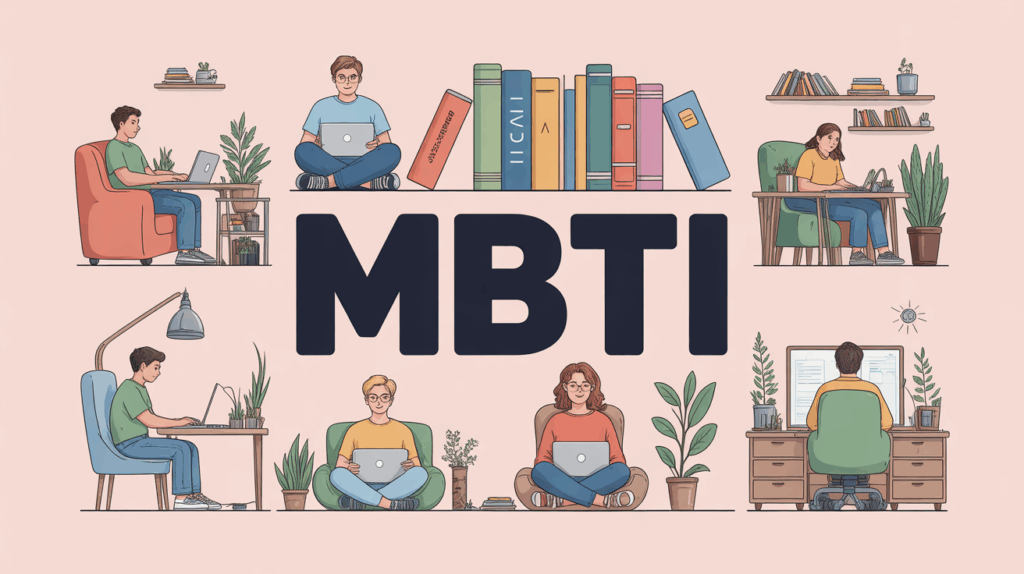
Introduction 🌱
Remote work has become a defining feature of modern workplaces. While some people love the independence of working from home, others struggle with isolation or distractions. Personality type plays a big role in these differences. By exploring MBTI remote work insights, we can see which types naturally thrive in a home office environment and which ones may need more support.
Personality Overview 🔮
The Myers–Briggs Type Indicator (MBTI) divides people into 16 personality types. Each type comes with distinct strengths and challenges. When applied to remote work, MBTI helps us understand why certain people adapt quickly to flexible work arrangements while others feel disconnected. Looking at MBTI remote work patterns, we can better predict productivity and satisfaction across types.
Remote work is not just about where you sit—it’s about how you structure your day, interact with others, and manage personal energy. Personality plays a huge role in these areas. For example, extroverts may find the lack of daily office buzz draining, while introverts often feel more empowered when given space to focus without interruption. Understanding these contrasts is essential for creating healthy remote teams.
Key Traits 📚
Here are six powerful insights into how MBTI types respond to remote work:
- INTJ and ISTJ: Focused Productivity
These types thrive on structure and independence. Working from home gives them the space to plan, execute, and concentrate without constant interruptions. Their ability to stick to routines allows them to maintain consistency even in flexible environments. - ENTJ and ESTJ: Leadership in Digital Spaces
These natural leaders adapt by organizing virtual meetings and ensuring goals are met. They prefer clear systems and may push for strong digital project management tools. Their assertive style ensures team accountability in remote settings. - ENFP and ENTP: Creative Freedom
Remote work allows their ideas to flow, but they may struggle with discipline. They excel when given autonomy but still need check-ins to stay on track. A mix of freedom and structure helps them avoid procrastination. - INFJ and INFP: Meaningful Independence
These introspective types enjoy the quiet space remote work offers. They feel energized when their tasks align with personal values, but risk over-isolation if social contact is lacking. Scheduling purposeful interactions helps them maintain balance. - ESFJ and ENFJ: Social Motivation
These types need people interaction. They can thrive in remote work if regular video calls and collaborative projects are part of their routine. Without connection, they may lose momentum, so building community online is key. - ESTP and ESFP: Action-Oriented Challenge
These energetic types may find remote work stifling without variety. They need dynamic goals or opportunities to balance online and offline activities. Adding physical breaks or new challenges can keep them engaged.
Comparisons ⚔️
- Introverts vs Extroverts: Introverts (e.g., INTJ, ISTJ, INFP) generally enjoy remote work more, as it gives them quiet focus. Extroverts (e.g., ENFP, ESFJ) may struggle without regular interaction.
- Judging vs Perceiving: Judging types prefer structure, schedules, and consistent routines, making remote work easier to manage. Perceiving types like flexibility but may risk procrastination.
Another comparison worth noting is how Thinking types (e.g., ENTJ, ISTP) focus on efficiency and output, while Feeling types (e.g., ENFJ, INFP) emphasize connection and emotional well-being. These differences highlight why remote policies should not be one-size-fits-all.
Lessons 💡
From exploring MBTI remote work, we can learn:
- There is no single “best” type for remote work—success depends on aligning strengths with structure.
- Extroverts benefit from intentional social connection, while introverts thrive in solitude.
- Leaders can adapt by embracing digital tools, and creatives flourish when autonomy meets accountability.
- Remote work culture improves when differences are acknowledged and team practices reflect diverse needs.
These lessons show how personality awareness can transform remote work into a more balanced, productive experience.
Final Thoughts 🌟
Remote work highlights the strengths and struggles of different personality types. By understanding MBTI remote work, we can adapt environments that allow every type to thrive—whether through structure, social connection, or creative freedom. When teams recognize these differences, they can build stronger, more flexible workplaces for the future. The more organizations understand personality-driven work styles, the better they can design systems that encourage both productivity and well-being.